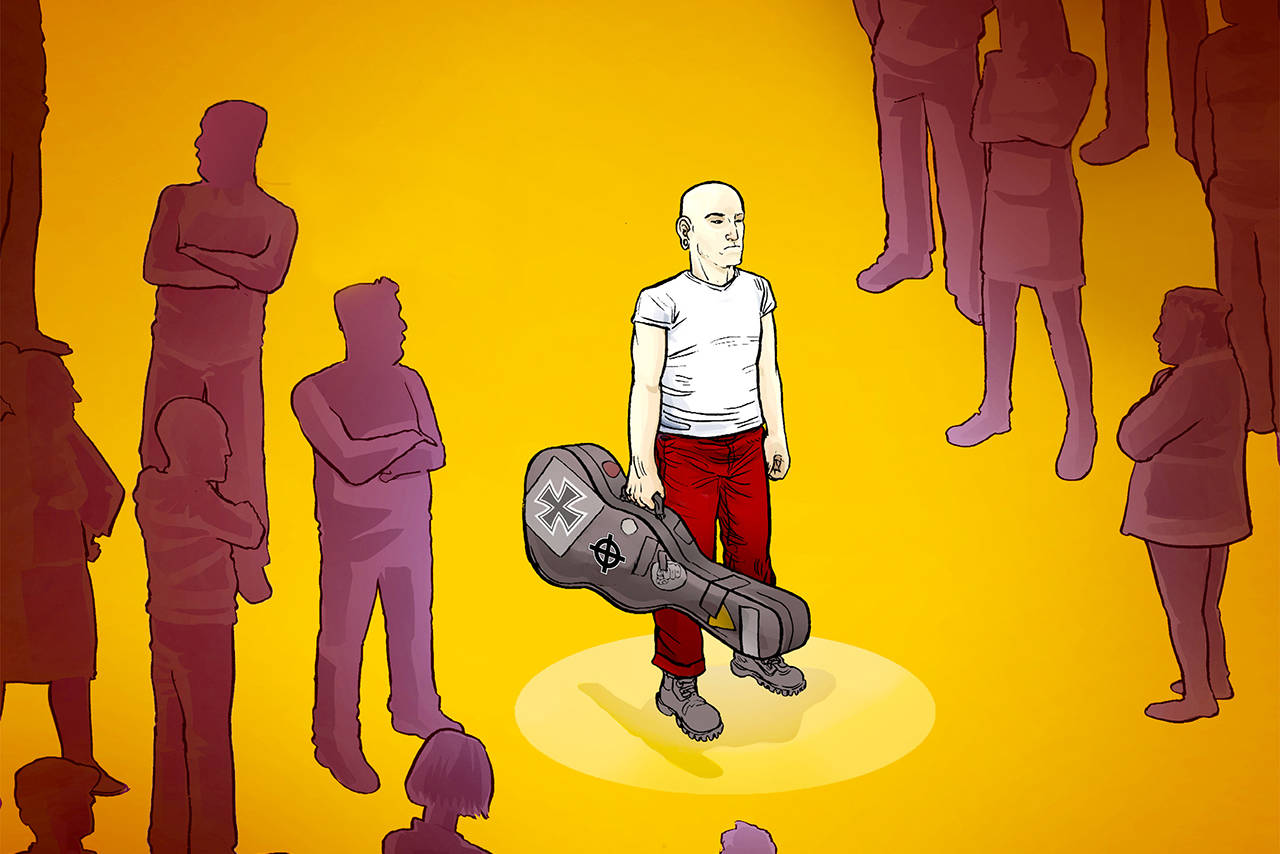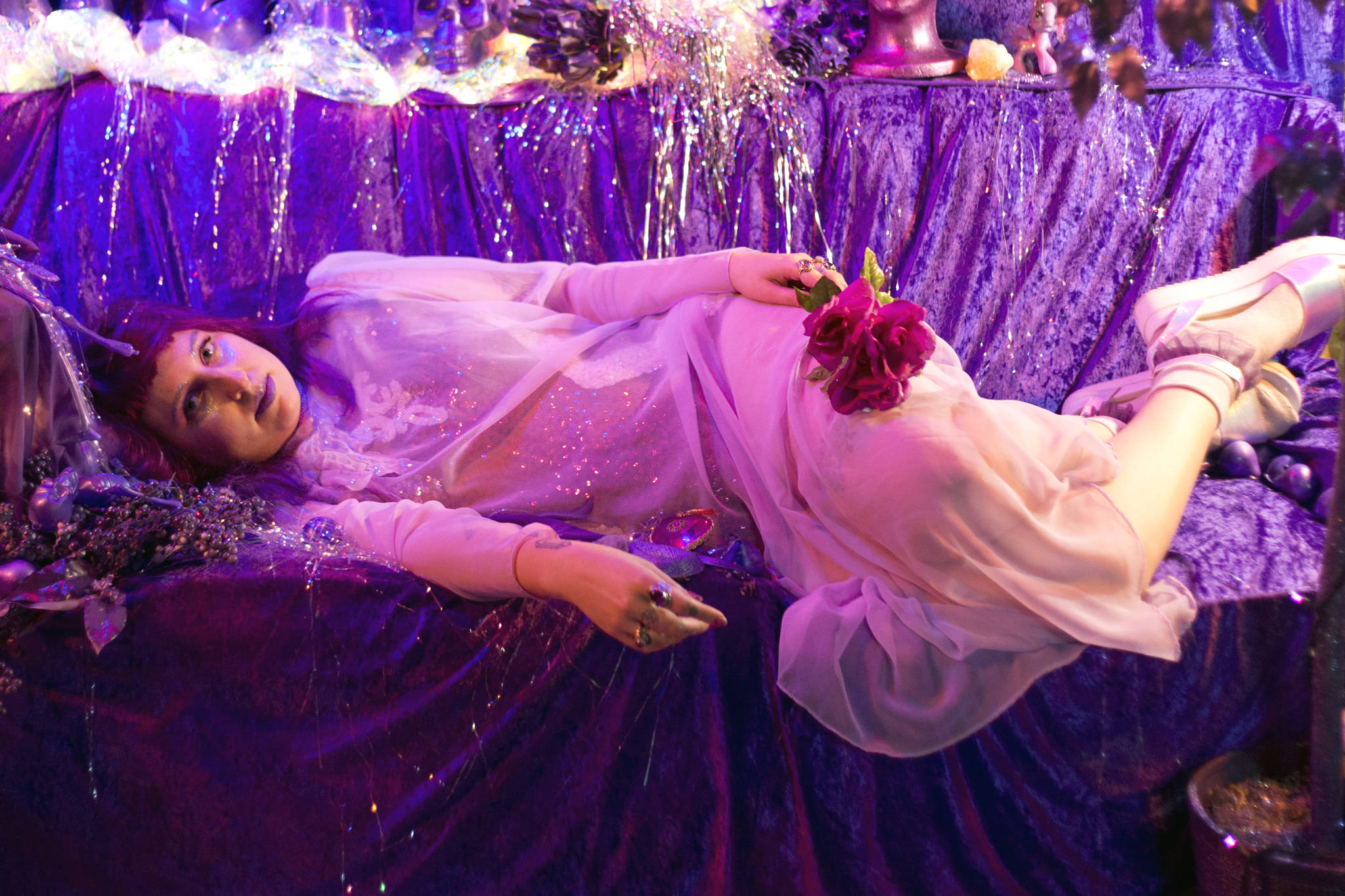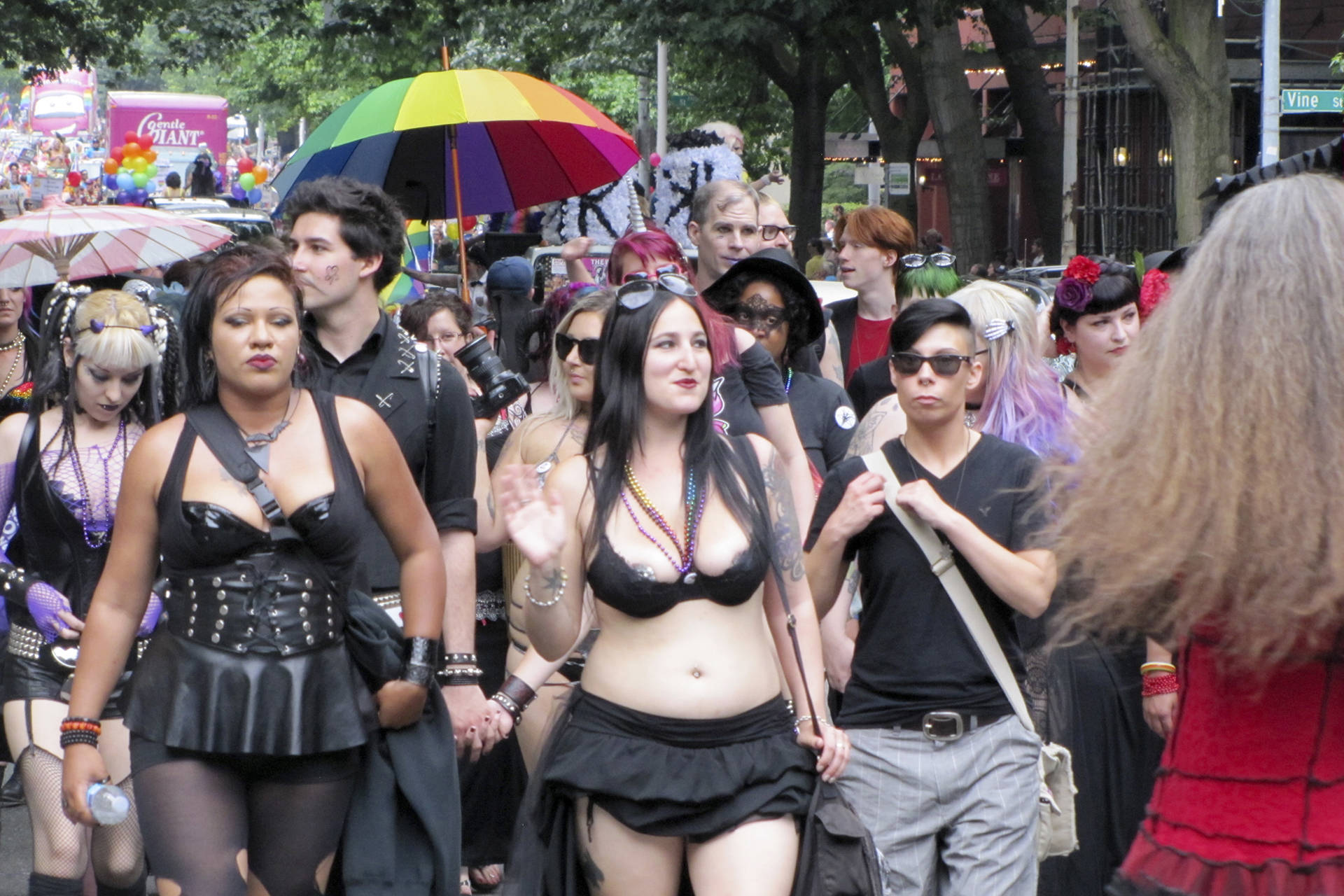At a show entitled no. NOT EVER., currently on exhibit at the University of Washington’s Henry Art Gallery, guests are invited to post acts of white-nationalist activity they’ve witnessed on an interactive timeline.
A steady slew of sticky notes spans the wall from 1970 to the present, where suddenly the timeline swells into a yellow cluster: alt-right figure Milo Yiannopoulos speaking at the university. The anti-Sharia protest. Neo-Nazi posters appearing on campus. The message is stark, and self-explanatory. “Why is this getting worse?” one note mourns. Tucked among these notes are reports from the past couple of years: a white power band playing in Pioneer Square, local media endorsing a show with a white nationalist headliner.
These incidents speak to a phenomenon corroborated by club owners and talent bookers: Along with the mainstream ascent of white-nationalist politics, white nationalism has slowly but surely begun to creep into Seattle’s music spaces.
On a recent Sunday evening, members of the music community met at The Vera Project to discuss the increasing presence of white nationalism in Seattle’s scene. An open call on social media summoned bookers, promoters, bartenders, venue owners, staff, and musicians to participate and to brainstorm creative solutions to counter fascism: “This is a heads-up: There have been recent reports of white nationalists infiltrating Seattle music spaces. They’ve been hanging out at local bars and nightclubs, and even getting their bands booked, often as a mistake by progressive folx…This is an opportunity to share resources, network, and collaborate around how to keep each other safe against these fascists in our music spaces and in our greater communities.”
Seattle journalist and publicist Chris Estey, one of the people who shared the post on Facebook, says that he felt it was important to spread the invitation because of his own experience witnessing white supremacy in Seattle’s music scene firsthand after doing PR for the Fantagraphics book Listen, Whitey! The Sounds of Black Power 1965–1975 and its companion soundtrack. Estey says that white nationalism is becoming “much more visible” in the mainstream, including in the local music scene. “I’ve been a punk since 1979, and again have been encountering these types personally in our milieu off and on for decades,” Estey says. “Now it’s becoming more common, and that’s why I will help the cause however I can to out these scumbags.”
Before the meeting, members of an antifascist group were gathered in a circle outside. One, who preferred to remain anonymous, identified himself as an activist since the early 2000s. “The ascendant alt-right is a fascist movement and needs to be dealt with… and can’t be ignored or wished away by good feelings or thoughts,” he said. “This is one of the ways that fascist groups begin and try to get a hold of the community.”
Inside The Vera Project, many attendees were longtime veterans of the punk and hardcore scene, who had been privy to racism and violence in their communities for years. One antiracist activist and artist who attended, and who also wished to remain anonymous, told me, “I’ve generally stopped going to shows. And the reason I’ve stopped going to shows is because I feel unsafe, not only with an uptick in crimes but with the measurable increase in racism in Seattle. And when someone who’s spent time in the skinhead scenes feels unsafe enough that they’re not even going to shows, that says a lot. And it’s getting even worse.” She added later, “As a woman of color, I’ve felt a change in the air; there’s something intangible but threatening. When I’m in public, the back of my neck tightens in anticipation of racism, misogyny—really, any of the forms of hatred that Trump has not only condoned but actively encouraged through his heinous example.”
Though people in Seattle’s music scene say it’s more common for white-nationalist bands to promote their ideas subtly in their music, a couple blatant examples stand out. In 2014, Studio Seven in SoDo booked a performance with the band Death in June, led by English musician Douglas Pearce with imagery that draws heavily from Nazi Germany. While many criticized Studio Seven’s choice to give Death in June a platform, others vehemently defended the band’s iconography. The show was protested but ultimately went on. A year later, the white-supremacist group Northwest Hammerskins announced they were planning a celebration of Martyr’s Day, the anniversary of neo-Nazi leader Robert Mathews’ death, with a concert featuring five white-power bands such as Ironwill and Beer Hall Putsch, along with a cross-burning and march through Capitol Hill. The event, which was met with a vocal counter-protest by hundreds of antifascists, never happened. Skinheads later claimed that the event was a hoax to rile antifascists, and that a few dozen of them had met at a private residence to watch the bands perform.
In another contentious incident, the Bellingham black-metal band Slutvomit was forced offstage by security at the Kraken in the U District last December after attempting to auction off a cassette of a noted white nationalist band, an account that appears to be confirmed in a statement attributed to the band that appeared on the blog for a regional metal zine. A representative of the band denies that it authorized the statement that was published by the zine while confirming that the band did make at least one reference to white supremacy on the evening in question. She tells Seattle Weekly that the comment was intended as a joke and that “the statement during the band’s set was putting down white supremacy by mocking the band Burzum, who are openly racist.”
Since the emergence of skinhead punk, music has served as a potent organizing tool for white nationalism. According to Devin Burghart, vice president of the Institute for Research and Education on Human Rights and author of the book Soundtracks to the White Revolution: White Supremacist Assaults on Youth Music Subcultures, white-power bands are the number-one source of revenue and the leading method of recruitment for the movement. “Since it started back in the mid-1980s, music has helped bridge the gap between hardcore white supremacy and healthy youth rebellion,” he says. “It provides both an accessible and easy way to tap into young people’s feeling of alienation, and provides a sense of identity and belonging in a way that is less threatening and less overt than a lot of other methods, so it’s been pretty successful for a long time.” White-power music provides fodder for violent genocidal fantasies, galvanizes followers, and bankrolls tangible political action, all in one fell swoop.
To normalize white nationalism and recruit new followers, white-power bands prioritize breaking into mainstream scenes, and one of the most effective ways is to latch onto other genres and subcultures. “The biggest thing that they’ve been really successful at doing since the ’90s is mimicking other youth subcultures and then essentially trying to colonize those subcultures by use of that mimicry,” Burghart says. “Whether it’s in the extreme music scenes, like black metal, or any of the other alternative music subcultures, white-power activists have tried to essentially adopt whatever musical genre it is and then use that format to pump in the ideas of racism and bigotry … They’re trying to adapt to the change in music styles and then at the same time trying to establish a foothold for themselves and push out other folks who would disagree with them within those music scenes.” Burghart cites national-socialist black metal, or NSBM, as an example of a black-metal subgenre that has had success in invading a scene.
According to If You Don’t They Will, the collective of cultural organizers who orchestrated no. NOT EVER. and the meeting at The Vera Project, music also cultivates a gestalt of solidarity for white nationalism. “White nationalism’s social movement is incredibly diverse in its strategies. They don’t all like each other. They don’t all listen to the same music. They don’t all dress the same. But they are united through this vision of who’s a true American and what America should look like. And music is so key to that, building that feeling.” (Members of If You Don’t They Will asked for quotes to be attributed to the name of their organization, rather than individuals.)
White nationalism is an issue that many venues and bookers working in the Seattle music scene appear hesitant to address. Burghart says, “I think it’s part of that general Seattle ethos, about not really wanting confrontation. I think the music scene is more a reflection of that in general … Outside of the Hammerskins concert … there haven’t been a ton of really obvious, overt examples of this, so I think that folks are likely to not actually have thought about it. Because they haven’t had to confront it directly, there’s not the same kind of obvious need for speaking out against it. Which I think is a shame.”
Just because the activity is not immediately perceptible, however, does not mean that the need for action is any less dire, says the collective. White nationalists have adapted to blend more effectively into music scenes, they say, adopting coded rhetoric and appropriating liberal buzzwords to appeal to inclusive, progressive spaces: “There’s definitely an increase in using mainstream multicultural discourses,” If You Don’t They Will says. “Like, ‘We don’t hate anyone, we just want to be included too. And you believe in inclusivity, so what about us?’ Or ‘We just want to love our heritage!’ … There’ve been flyers at clubs from European heritage groups, and they’re like ‘What’s wrong with that?’ No! We need to smash whiteness, not return to it.” In addition to veiled language, white nationalists in music scenes often broadcast their shared views through the use of symbols, which can be difficult for outsiders to decipher. While some icons, like swastikas and “88”tattoos (code for “Heil Hitler”; H is the eighth letter of the alphabet), might be apparent, others may be less readily legible to the uninitiated.
Because of these strategies of assimilation, Burghart says it’s remarkably easy for even experienced veterans to book one of these bands by mistake. “We’ve talked to club owners around the country,” he says. “White-power musicians have gotten so good at cloaking their message and camouflaging their identity so it’s only seen by folks in the know—it becomes harder and harder for [others] to identify this stuff easily.”
Emphasizing the necessity of proactive strategies, Burghart warns of the danger of waiting until it’s too late to act. He has witnessed firsthand music communities, such as the oi and punk scenes in Chicago, threatened by white nationalism run rampant when the members of the scene weren’t prepared to confront it directly. “Folks I know who were in a lot of different music scenes…their biggest regrets often when these things happen are that they didn’t speak out sooner, or that they let it get to a point where it really tore the scene apart—either because of the infighting, or because it was a toxic place that nobody wanted to participate in anymore, and it made it impossible for them to really have that continued sense of identity and belonging that they looked for in a music scene.”
If You Don’t They Will stresses the critical importance of building and enforcing rules to shut white nationalists out. Their name stems from the idea that if you don’t draw a strict boundary, fascists will inevitably encroach on a space. To the group, not enforcing a hard-line policy to exclude white nationalists is tantamount to collusion: “If you don’t clearly contest that space and draw a boundary on it and say ‘No, this is not open for this kind of behavior and for white nationalists … this is a clearly antiracist space,’ then it’s up for grabs. And so if you don’t claim it, they’ll claim it.”
“Inclusivity doesn’t necessarily mean that an organization doesn’t have an opinion on something,” says Eric Carnell, co-chair of The Vera Project’s screenprinting committee. “An organization can be very opinionated in its stance on something, but still try and maintain an inclusive space. That’s a really important distinction for everyone to understand.”
For many club managers, having an encounter with white nationalists in their venue may be the first time they’ve ever considered their stance. Because of this, If You Don’t They Will stresses the importance of building plans that anticipate white nationalism so that they aren’t deciding on their policy in the middle of a crisis. The challenge lies in finding a way to make every space “uniquely inhospitable” to white nationalism. Some venues accomplish this by displaying prominent signage, making it unmistakably clear that hatefulness is not tolerated from the get-go. For example, The Vera Project has a mural over its check-in desk condemning drugs, alcohol, inappropriate sexual behavior, violence, weapons, bigotry, and hate; and the Comet displays a sign depicting a fist: “No sexism, racism, ableism, homophobia, transphobia, or general hatefulness. You will be asked to leave.” According to If You Don’t They Will, this can be a particularly effective strategy because it gives venue staff something to lean on when confronting fascism in the moment—an immediate visual reminder that others at the venue are backing them up in their decision. One of the resources in no. NOT EVER. suggests that a sign “offers leverage to patrons, staff, customers, community members” and “engenders the kind of complex, messy, ongoing conversations crucial to setting proactive and reactive antifascist boundaries.”
Resisting white nationalism is a problem that resists any easy or universal answers, and requires continual revisitation and conversation. While solutions may differ from situation to situation, saying no should be the common denominator. “Saying no is an act of solidarity,” says If You Don’t They Will.
To dissenters who claim that restrictions against white nationalism are somehow negative or not inclusive, If You Don’t They Will argues that saying no is in fact a positive act of assertion that opens a space for more inclusivity, and that it “allows us to have the imagination-building capacity and space to envision the kinds of worlds we do want to live in. The kinds of music spaces we want.” By eliminating what they don’t want, venues broaden, rather than narrow, the scope of possibility for their space.
“Now, let’s roll up our sleeves! What the fuck do we want?” If You Don’t They Will says. “And that feels good. To see that as a possibility and work towards it. It feels energizing.”
music@seattleweekly.com
CLARIFICATION The account of the incident during the Slutvomit performance has been altered. There was only one confirmed comment about white supremacy from the band, which a representative of the band contends was a joke, adding that Slutvomit has no affiliation with white nationalism.








